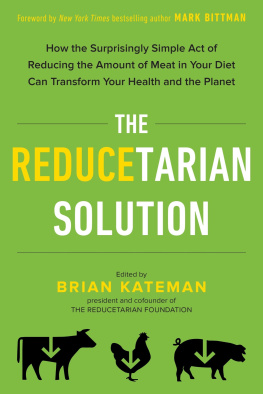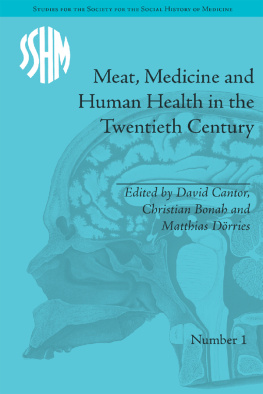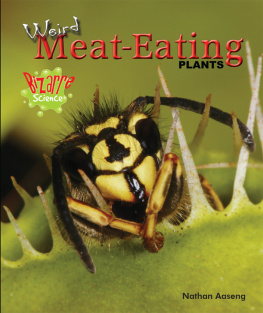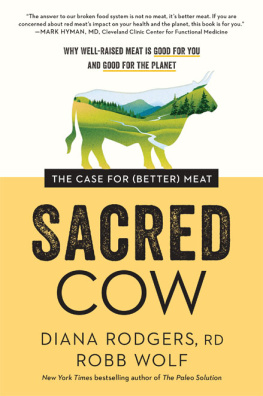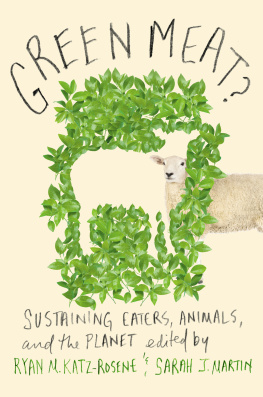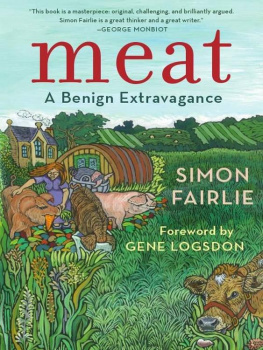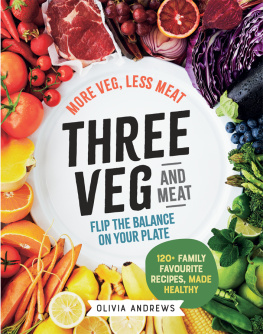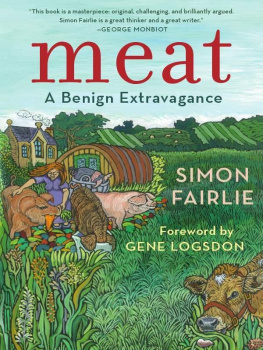Meat Me Halfwayand the reducetarian movement from which it was bornis the culmination of a near decade of benefiting from the insights, kindness, and hard work of literally thousands of people I have come to deeply admire. This book is for and because of you.
I am enormously grateful for my agent, Linda Konner, who has proved to be a fierce alley in my literary pursuits. Few writers are as lucky as me to have someone who is as skilled and honest as you in their corners.
To Jake Bonar: Your enthusiasm for the book on behalf of Globe PequotPrometheus Books means the world to me. Thank you for believing in the promise of Meat Me Halfway the moment it came across your desk. And kudos to Jessie McCleary and Jess Kastner for their assistance with producing, marketing, and publicizing the book.
I owe a great deal to Nicholas Bromley and Rhys Southan, whose editing skills are unparalleled, and the book is surely more concise and reasonable because of it.
Its hard for me to overstate the enormous influence Sofia Davis-Fogel has had on the way I think, and the way I think about the world.
Thank you to Emily Byrd for making the manuscript as factual as possible.
Im grateful for Chris Davidson and the eye-catching book jacket he designed. You are a supremely talented graphic designer.
To Journey Wade-Hak, who put his blood, sweat, and tears into the documentary version of Meat Me Halfway, much of which is a part of this book: You are not only a talented director, but also an enormously decent human. You are the Rick to my Morty.
Thank you to all those who contributed quotes to this book. Each of you are a wealth of knowledge and I so appreciate your expertise and willingness to share your wisdom with me.
Im especially grateful for my mom and dad, who add color to my life and every single one of these pages. I am in your debt for loving me unconditionally.
To Tobey and Cooper: Thank you for all the snuggles and licks. My life is more silly, joyful, and calm because you two nugglets are in it.
To all of my dearest friends (including but not limited to Dan Feldman, Mike Young, David DiLillo, Danielle Medina, Vincent Romano, Arthur Kapetanakis, Joe Eastman, and Michael Trollan): Thank you for making me laugh whenever I needed it most.
And to Isabel, my wife, my best friend, my everything: I love you always and forever. Its as simple as that.
Hey, Barn, you like your steak rare?Fred Flintstone
About a decade ago I attended a summer pool party in New Jersey with my now wife, Isabel, and a dozen of her coworkers and friends. Isabel and I had only recently started dating, and I was a bit nervous about meeting her friends; it had been about a year since the last time Id eaten meat, and expecting only traditional barbecue fare, I brought a sad, soggy package of veggie burgers with me. Fortunately, thanks to Isabel, our gracious host Alice already knew I was vegetarian, so shed purchased some much nicer veggie burgers for me in advance.
After a few hours of frisbee, swimming, and booze, it was lunchtime. Alice asked each of her guests what they wanted to eat: hamburgers, hot dogs, steaks, chicken cutlets, or veggie burgers. After collecting everyones order, she fired up the grill and a tantalizing aroma filled the air. It was a familiar smell, a heavenly concoction I instantly associated with smoked meat. I knew intellectually it wasnt something I wanted to crave, even internally, but I found myself practically salivating over it anyway. It was distressing to realize just how intense the craving was; I hadnt experienced cravings this powerful in a long time. We all took our seats as the host placed platters of food at the center of our table. I reluctantly fashioned a veggie burger with some fixings while everyone else eagerly assembled a plate of meat. I normally love a good veggie burger, but I knew even before I bit into this one that it wasnt going to save me from this primal tailspin. After wolfing it down, I was even more irritable and dissatisfied than before.
Finally, I couldnt take it any longer. Nonchalantly, I grabbed a juicy, delicious hamburger and then quickly devoured it. I hoped nobody would notice, but of course everyone did, and an uncomfortable conversation about my hypocrisy and our seemingly ingrained pull toward meat ensued. That wasnt the last time I ate meat, and it certainly wasnt the last time I yearned for it. Where does this deep-seated lust for meat originate? Is it culturalperhaps associated with happy childhood memories of grilling burgers with my dad in the backyard? Or is there something more primal going on?
The answer is complicated. According to science journalist Marta Zaraska, author of Meathooked: The History and Science of Our 2.5-Million-Year Obsession with Meat, for tens of millions of yearslong before Homo sapiens first began walking the earthour distant ancestors primarily ate plants. Consider Purgatorius, the earliest common ancestors of primates, who hit the Mesozoic scene somewhere between fifty-five and eighty-five million years ago. More closely resembling todays squirrels or lemurs than gorillas or chimpanzees, Purgatorius emerged in tropical or subtropical forests after some small, shrew-like, insect-eating mammal climbed into the trees, perhaps in search of some grub. This was the start of an extraordinary transition, with the descendants of this arboreal explorer coming to rely substantially on fruits, leaves, and flowers from the canopya change that set the stage for the emergence of the primate order. From tiny monkeys to large apes, they developed a host of superhero-like adaptations over timeincluding enhanced depth perception, acuity, and color visionto help them discern the presence of plant parts that ornamented trees, shrubs, and herbs.
As more time passed, primates diverged into various lineages, and some continued to eat these plant foods, while others added new ones, like seeds and nuts, into their diets. Even when the hominin (early human) lineage formed with the last common ancestor of chimpanzees and bonobos (our closest living evolutionary cousins) in Africa about five to eight million years ago, plant-based eating had not yet gone out of style. Take, for example, Orrorin tugenensis, one of the earliest hominins on record, who lived just under six million years ago. Orrorin tugenensis sported small canines, low rounded molars, and thick enamel, suggesting a diet of mainly leaves, fruit, seeds, roots, nuts, and insects.
It isnt until about three to four million years ago that evidence of a possible wrinkle in plant-based eating begins to show up in the fossil record. In 1994, for example, scientists discovered a remarkable four-million-year-old skeleton in Ethiopia belonging to Ardipithecus ramidus. Its teeth, which had neither very thick nor very thin enamel, reveal Ardipithecus ramidus likely followed a more generalized, omnivorous diet, one that may have included some small mammals in addition to new plant foods like grasses and sedges. Similarly, chemical analyses of the teeth of another hominin species, Australopithecus africanus, who roamed the earth about three million years ago, suggest the species diet also may have included a small amount of meat. All told, early hominins may have had a diet similar to modern chimpanzees, who on average eat meat fewer than ten days per year.
Any substantial uncertainty concerning meat-eating in hominins disappears about 2.5 million years ago, slightly before the arrival of the genus Homo. This is when fossilized bones with cuts and percussion marksclear signs of butcheryas well as stone tools appear in the fossil record. For example, in the 1990s, at a site in Bouri, Ethiopia, paleontologists discovered 2.5-million-year-old cranial and tooth remains from a single individual whom they dubbed


